|
COVER STORY | IN THE NEWS | STAGE MATTERS | ARTBEAT September 7, 2006
by CATHY MILLER IT'S LATE AUGUST. THE EVENING SUN IS MAKING ITS SLOW DESCENT OVER PATCHWORK ACRES OF ORGANIC VEGETABLES AND ROWS OF SUNFLOWERS, all thriving in the rich, alluvial soil of this ancient riverbed land next to the Eel. I'm early for a meeting here at the Southern Humboldt Community Park, and the garden looks so inviting that my friend Missy and I decide to take a stroll through it. Two men I recognize, both back-to-the-land baby boomers who came up to Northern California to homestead in the early '70s, are down in the dirt planting late summer starts Westley Stoft, a leather goods craftsman, and Joaquim Hershman, a master gardener.
"We're doing the actual work the localization group's planning meetings," Hershman laughed, good-naturedly. Hershman is the unofficial director of the "Farm Club," a community-sponsored agricultural group of SoHum residents who meet here Saturday mornings, to help the caretakers weed, cultivate, pick and transplant. Right: Volunteers at the Southern Humboldt Community Park. Photo by Pierre Gaude. There's a gentle, balmy breeze blowing across the landscape this evening, and my friend, who knows volumes more about herbs and flowers than I, has gone on ahead to look at the herb labyrinth. As I walk along a path, the beauty of it all luscious red amaranthus, shards of golden light alternating with long shadows cast from sunflowers bursting with seed takes me back to why I'm here: Here in southern Humboldt, the place I chose to live 30 years ago, and here at a meeting of Southern Humboldt Economic Localization (SHEL). SHEL is one group of over a hundred similar organizations that are spreading throughout the world to begin planning and working cooperatively in preparation for the inevitable arrival of a time when the world's oil supply has peaked and cooperative gardens like this may essentially become a community necessity.
Scientists have been warning us for decades that unless we begin using dramatically less fossil fuel, there will be dire consequences if not in our lifetime, in our children's. In 1956, at a conference of the American Petroleum Institute in San Antonio, Texas, a U.S. geologist working for Shell Oil, M. King Hubbert, predicted that oil production from the U.S. lower forty-eight states would peak between 1965 and 1970. He did so despite pressure from Shell Oil to keep it quiet. His announcement met shock, consternation and mostly denial from the petroleum industry. Hubbert, a leading scientist in the field of geophysics, had arrived at his conclusion after his research showed that oil discoveries, graphed over time, tended to follow a bell-shaped curve. He reasoned that oil production would follow a similar curve (now known as the Hubbert Curve). In 1970, what had been dismissed by many as the alarmist conclusion of an overzealous scientist came to pass. Oil production in the continental U.S. peaked. Although it passed largely unnoticed, some would argue that the U.S. oil peak was the most significant geopolitical event of the mid-20th century. It created the conditions for the energy crisis of the 1970s, lead to a marked increase in U.S. strategic emphasis on controlling foreign oil sources and marked the beginning of the end of the U.S. status as the world's major creditor nation. Of course, with the U.S. able to import oil from elsewhere, life here went on with only minimal interruption. Another prediction Hubbert made, one with far greater implications, is that global oil would peak between 1995 and 2000. Using Hubbert's methods and variations on them, various predictions have been made about the global oil peak, ranging from "already happened" to the year 2040, the latter date considered very optimistic. Precise predictions are difficult, as apparently a lot of secrecy shrouds important oil and gas data, but most place the peak happening sometime within the next 15 years. Above: Mishka Straka, a past Community Park caretaker, at the farmers' market. Photo by Pierre Gaude.
Why haven't we heard more about this? Jason Bradford says, simply, "If [people in the U.S.] don't already know this, perhaps it's because the press has failed in its duty to inform [them]." Bradford is the founder of Willits Economic Localization (WELL), a group that is considered a model for what can be done in relocalizing small towns. He and his young family moved to Willits from the Midwest in 2004.
Right: Lisa Solaris working in the Community Park garden. Photo by Pierre Gaude. "In reality," Bradford wrote in an essay, "we are undermining the prospects for the persistence of civilization on this planet." Not mincing words, Bradford states that "to have any real chance of preventing ice caps from melting, ocean currents from failing, large-scale deserts from forming where cropland now exists, etc., we will have to cut back our use of fossil fuels by 80 percent and get started right away." The city of Willits is setting a national example, being the first city to sign a statement calling for a local and sustainable economy. Willits is building one of the first green hospitals in the U.S. The city has installed a photovoltaic energy supply system for the water treatment facility and the Willits News publishes weekly energy tips. The Willits school board recently approved a one-acre farm on school property to grow food for the school and community. WELL has written grants to help develop local food systems. Why aren't WELL and similar groups getting more attention? Until recently, national mainstream media has been reluctant to report much on peak oil, the need for localization and, most importantly, perhaps, the need for a global post-carbon survival strategy. What stories there were in mainstream news were timid at best, presenting hard evidence as theory and ending with the all-too-familiar "If this is true, we're in for trouble"-type hypothesis. (Meanwhile however, astute viewers can describe at least four of Jon Benet's beauty pageant outfits). This may be changing. The August 2006 issue of Harper's Magazine did a cover story on the peak oil movement entitled "Imagine There's No Oil: Scenes from a Liberal Apocolypse," by Bryant Urstadt. On one peak oil website, the article was described as "the outing of the peak oil movement to the general public."
Missy and I finally wrest ourselves away from the dream garden of the Community Park, making it to the meeting just as it's starting. Sitting in a circle on the grass in the shadow of the mammoth old-growth redwood barn built by old Tooby more than 100 years ago, the group is a mix of familiar faces, early 20s to late 60s, liberal, individualist and well-schooled in the work and art of homesteading. Anne Seaquist, an earnest environmental activist (though a little too young to be a baby boomer) is sitting on the grass with a large flip chart that outlines the agenda. It's the monthly meeting people are catching up with their friends and talking across the circle about the farmers' market, bears getting in their apple trees, their springs slowing down. The sun is now almost to the horizon, though, so Anne calls the meeting to order in a rather strident voice. ("It's the only way to get anything done," she tells me later. "Otherwise, too much crosstalk.") The meeting proceeds with updates on what's been happening with ongoing projects and committees. In the last half-hour, we break up into groups to discuss transportation, food and events, and then reconvene to report back to the group. I listen in on the transportation committee, where there's a lively discussion of the viability of using the Zebra, a new model of electric car, in our area. It was decided that it wouldn't have enough power to take the hills on dirt roads. Seaquist, who started SHEL with other SoHum residents including Amy Conway, Star Faraon, Peg Anderson and Yoshi Hoffman of Chautauqua Natural Foods sees localization groups as "an opportunity to create the communities that we truly want, that give room for all members to have their needs met on a scale that matches the ecological economy of our watersheds, ideally within our bioregion." Hoffman, who was at the meeting and who recently spoke to the Garberville /Redway Chamber of Commerce about peak oil and SHEL, suggests we ask the elders in this area to share their farming and homesteading skills with us. Anderson adds that she'd like to draw in the disaster-preparedness people and people involved in stream restoration, to share their information and expertise. Hoffman and Anderson underwrote a showing of The End of Suburbia, a peak-oil documentary, at the Garberville Theatre last March, to educate community members and attract them to participate in SHEL. Several meetings and more screenings of the film followed and the group is now fully engaged, with over 400 community members involved at widely varied levels, from just going to hear the speakers to actively working on projects. In addition to doing a Community Supported Agriculture program in conjunction with the community garden, which sells its produce at the local farmers' markets and to local stores, they started Garberville Community Bike Shop, a collective that offers free bike mechanics/maintenance workshops, sponsors community bike rides, and is interested in getting people to use their bikes more when possible instead of cars and establishing a bike trail between Redway and Garberville. But the WELL and SHEL are far from the only groups in our regions actively planning for the day the oil starts to run out. Kent Westwood of Laytonville is a relocalization
activist who doesn't think that the world will run out of oil
in our lifetime, but sees oil becoming way too expensive to live
the kind of lives in the future to which industrial societies
have become accustomed. He wants to be prepared. Westwood is
active in Laytonville's group, Sustainable Laytonville, which
started on Earth Day 2005 with a showing of The End of Suburbia.
They have about 50 active members who meet semi-regularly to
put plans into place f At the north end of Humboldt County, Susan Ornelas started the Arcata Humboldt Peak Oil Action group about 18 months ago. Ornelas, who has an education background is in environmental engineering and international development and has also worked for the Schatz Energy Research Center in Arcata, met me at Arcata's "Educational Garden." She started the garden a few years ago to teach permaculture, and it operates as a community cooperative. Left: Susan Ornelas Ornelas did a draft analysis titled, "Can Humboldt County grow enough food to feed its people?" Based on our 33,000-50,000 acres of prime farmland, 273,000 acres of range land and a population of 130,000 people on a generous diet of 2,800 calories a day, the answer seems to be that we can. In researching the history of agriculture in Humboldt County, she learned that native Americans in Hoopa, Willow Creek and in the Eel River watershed grew oats and wheat in these areas, a crop that people thought couldn't be grown here. Ornelas found that at the turn of the last century, Humboldt growers actually won a prize for the nation's best wheat at Chicago's Columbia Exhibition. Asked what she thinks people who know little about the energy problems we face should do to get started, Ornelas said "We just need to educate ourselves and look at ways we can live our lives less dependent on fossil fuels. A good start would be to go see An Inconvenient Truth. From there they can Google "relocalization," learn about it and join or start a group. See and host showings of The End of Suburbia to help educate the community and network with other groups."
Oil figures so largely in our current way of life
that the peak will have vast implications the world's economy
is so utterly dependent on it. Richard Heinberg, who has written
extensively on peak oil (including the book, Powerdown: Options
and Actions for a Post-Carbon World), tells us that
"industrial agriculture will go down the tubes, Right: Southern Humboldt Community Park greenhouse. Photo by Pierre Gaude. In our everyday lifestyles, in addition to so much of what we take for granted not only food and goods that must be transported from outside the area, but lights, appliances, computers, TV, clean municipal water, heat or air-conditioning for our homes are dependent on energy. Even the most committed back-to-landers, as many of us still aspire to be, still drive our fossil fuel-dependent cars into town or the city for things we need and want. Author Stephanie Mills, who admits to having a peculiar fascination with doomsday scenarios, says she's always believed that relocalization could be a good thing, but living through a rapid default into it could be a little rough. Some of the serious demand-side responses to peak oil that she sees are "households and regions growing their own food, staying home, cottage industry, walking ... inhabiting smaller, tighter homes in compact settlements and practicing extreme frugality." Oil's not the only source of energy, true. Alternative energies, conservation and energy carriers such as hydrogen will definitively play a role in future energy systems, but what the experts are saying is that there is no panacea, no silver bullet that will make this just go away. Even collectively, the present technologies will not be enough to preserve industrial society as we know it today. We need to make a paradigm shift in the way we run our societies and the way we look at ourselves and others. One local activist says to think of the planet as a rowboat and we're all in it. (O.K. it's a big rowboat). It's developed some leaks, and unless we all pitch in to plug up the leaks ... well, you know. We're all in this together.
As I drove home from town after the SHEL meeting in my fossil-fueled Honda, determined that my next vehicle will be a hybrid, I thought of a quote by a woman named Sara Parkin who I'd come across in researching this article. It asked, how can we be aware of these problems and not do anything about it? "Our numbness, our silence, our lack of outrage, could mean we end up the only species to have minutely monitored our own extinction," it reads. "What a measly epitaph that would make: 'They saw it coming, but hadn't the wit to stop it happening.'"
COVER STORY | IN THE NEWS | STAGE MATTERS | ARTBEAT Comments? Write a letter! © Copyright 2006, North Coast Journal, Inc. |


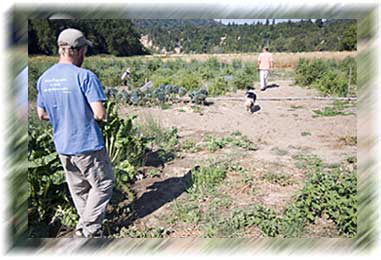 "We're
here for the localization group's planning meeting," my
friend and I tell them as we stop to chat for a moment.
"We're
here for the localization group's planning meeting," my
friend and I tell them as we stop to chat for a moment.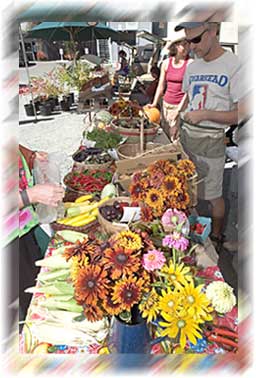 As
part of my research for this article, I interviewed people as
they came out of a Eureka movie theater after watching Al Gore's
award-winning documentary about global warming, An Inconvenient
Truth. One of the questions I asked was "Before seeing
this movie, had you ever heard of the term 'peak oil'?"
Six out of 10 people admitted they had not, including an attorney
up here on business from Walnut Creek and a high school history
teacher. Going to see An Inconvenient Truth is a good
place to start for anyone trying to wrap their head around the
issues of global warming, peak oil and the need for localization.
As
part of my research for this article, I interviewed people as
they came out of a Eureka movie theater after watching Al Gore's
award-winning documentary about global warming, An Inconvenient
Truth. One of the questions I asked was "Before seeing
this movie, had you ever heard of the term 'peak oil'?"
Six out of 10 people admitted they had not, including an attorney
up here on business from Walnut Creek and a high school history
teacher. Going to see An Inconvenient Truth is a good
place to start for anyone trying to wrap their head around the
issues of global warming, peak oil and the need for localization.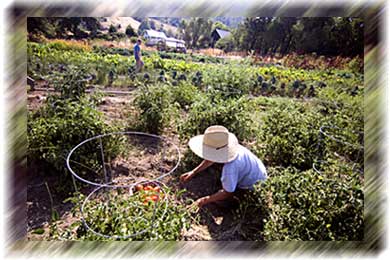 Bradford,
whom I spoke to by phone, has a Ph.D. in biology, and is extremely
active and committed to the localization movement. He became
interested in localization through a study he led with a group
of scientists called the Andes Biodiversity Consortium, funded
by the U.S. National Science Foundation. The consortium studied
the effects of global warming on plant and animal habitats in
cloud forests. What they found was that warming during the 21st
century was expected to be about 100 to 1,000 times more rapid
than ever before.
Bradford,
whom I spoke to by phone, has a Ph.D. in biology, and is extremely
active and committed to the localization movement. He became
interested in localization through a study he led with a group
of scientists called the Andes Biodiversity Consortium, funded
by the U.S. National Science Foundation. The consortium studied
the effects of global warming on plant and animal habitats in
cloud forests. What they found was that warming during the 21st
century was expected to be about 100 to 1,000 times more rapid
than ever before.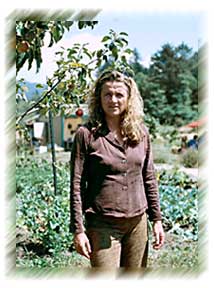 or
post-carbon living. Their food group has had an acorn processing
workshop and field trips.
or
post-carbon living. Their food group has had an acorn processing
workshop and field trips.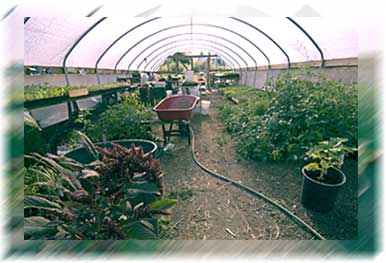 addicted
as it is to petroleum-based fertilizer and to crude oil for flying,
shipping and trucking its produce." In the geopolitical
realm, there'll be more war over oil and more environmental devastation.
Vice-President Dick Cheney's statement to the press that we won't
see an end to war in the Middle East in our lifetime is true
in this scenario (but not because we're trying to wipe out terrorism,
find WMDs or spread democracy).
addicted
as it is to petroleum-based fertilizer and to crude oil for flying,
shipping and trucking its produce." In the geopolitical
realm, there'll be more war over oil and more environmental devastation.
Vice-President Dick Cheney's statement to the press that we won't
see an end to war in the Middle East in our lifetime is true
in this scenario (but not because we're trying to wipe out terrorism,
find WMDs or spread democracy).